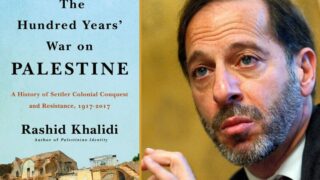After the "The McMahon-Hussein correspondence: phase one of the partition process" and "The Sykes-Picot agreements – phase two of the partition process", this article is the sequel of the roundup, presenting The Balfour Declaration, in context and detail.
'His Majesty's Government view with favour the establishment in Palestine of a national home for the Jewish people, and will use its best endeavou to facilitate the achievement of this object, it being clearly understood that nothing shall be done which may prejudice the civil and religious rights of existing non-Jewish communities in Palestine, or the rights and political status enjoyed by Jews in any other country'.
This short declaration, sent by the Secretary of State for Foreign Affairs, Arthur J. Balfour, to Lord Rothschild, constituted the first official public statement of support for Zionist aspirations by a nation-state. The Declaration intended to provide the Jews with a national home as well as secure British control over Palestine – which was in the area placed under international jurisdiction by the Sykes-Picot agreement – and the Suez Canal.
However, by linking Palestine to the Jews and failing to consult with the Arabs during the process, Britain separated the fate of Palestine from the rest of Syria and thus finalised its partition according to territorial as well as demographic lines. This confirmed the process started with the McMahon-Hussein correspondence and consecrated the separation and antagonism of the Jews and the Arabs.
This part examines the context of the Balfour Declaration as well as the arguments raised by the opposition to a British support to Zionism. Arguments that shed light on the separatist and exclusionary tendencies of Western imperialism as well as Zionism as a settler-colonial movement.
Imperialism, messianism and antisemitism
By 1916, Britain had on the one hand promised to acknowledge Arab independence (McMahon-Hussein Correspondence) and on the other hand worked out an agreement with France (Sykes-Picot Agreement), granting them parts of the Ottoman territories.

Nonetheless, another actor had emerged. Actually, Zionist interests had been in discussion among members of the Government since the turn of the century. Indeed, in the early 1900s, Theodor Herzl and Joseph Chamberlain – then Colonial Secretary – had been discussing about the possibility of Jewish settlements in Uganda – then part of the British Empire. The Uganda option had been rejected by the sixth Zionist Congress in 1905 but by 1906, Arthur Balfour and Winston Churchill then both MPs for the Manchester district continued to express their support for Zionism and a “settled Home” for the Jews. A.J. Balfour had even met with Weizmann who was then lecturing chemistry at Manchester University - he was to become one of the leaders of the Zionist movement. Churchill then adopted the idea of a “strong, free Jewish State astride the bridge between Europe and Africa” in Palestine. A few years later, Weizmann made contact with Lord Balfour and he seems to have had constant contact with members of the British government, notably David Lloyd George who was Prime Minister from December 7th 1916 to October 22nd 1922. The latter was rather sympathetic to the aspirations of the Zionist movement, probably because he despised the Arabs. Some twenty years later, he would explain his engagement in favour of Zionism as an alliance of interest with a very influential political organisation.
Now, it should be noted that the political, religious and cultural climate were somewhat favourable since evangelism and with it messianism were growing in Britain. Messianism and the concomitant idea of the return of the Jewish people to Palestine had existed since the 16th Century, but it was still developing through literary circles. So, there was the return of ideas of the re-conquest of Palestine, whether directly by Christians or indirectly by the Jews. According to protestant millenarianism, the return of the Jews to Palestine is supposed to represent the accomplishment of prophecies, which led non-Zionist Jews to regard Zionism as false messianism. Both Balfour and Lloyd George had been brought up in Christian evangelical families thus their religious background would certainly play some role along their anti-Semite beliefs. For instance, while working on the declaration, Balfour was supporting legislation aimed at limiting Jewish immigration in Britain.
In link to that, one of the strongest arguments in support of Zionism, rested on the belief that Jews had some kind of financial and political power – thus some influence – in Russia and in the United States, and that they could help Britain to get those two countries' support in the war effort. An argument that would often be laid by Weizmann but also by Balfour notably during the War Cabinet meetings preceding the adoption of the declaration. Balfour was concerned that Germany was doing its best to attract the sympathies of the Zionist movement which he thought enjoyed the support of a majority of Jews at least in Russia and the United-States.
However, his arguments were mostly based on myths and fantasy tainted with anti-Semitism they presented a mixture of ethnic policy and nationalism well known and used by A. Balfour as he was well aware of the situation in Ireland. In his task, arguing in favour of Zionism, Balfour was aided by the fact that both the French government and President Wilson had declared themselves favourable to the movement.
Opposition to Zionism, anti-semitism, exclusion and separation
As we have seen, the climate had been favourable to Zionist aspirations, however, although there had been contacts over a long period, the consultations prior to the Declaration's release were rather short and, there seems to be no trace of the exchanges that preceded the Declaration.
The Zionists' efforts to obtain Britain's support did not, however, go unnoticed and early on, a pitched battle between the Zionists and their opponents was carried on on the diplomatic front through a quest for official attention, then, on the media front with papers published in numerous newspapers.
Nevertheless, an interesting critic emerged from within the Government. Edwin Montagu who had newly joined the Cabinet was indeed an anti-Zionist. In a Memorandum entitled “The anti-Semitism of the present government” dated from August 23rd, 1917, the new Secretary of State for India criticised Zionism as false messianism, the repatriation of the Jews to Palestine was supposed to require a Divine intervention and neither Balfour nor Lord Rotschild would prove to be the Messiah.

Depicting Zionism as a “mischievous political creed, untenable by any patriotic citizen of the United Kingdom”, Montagu feared that by supporting the Zionist Movement, British policy would fuel anti-Semitism. And even more so since “none could claim to know what the majority of the British Jews thought of Zionism. He fought the idea that there even existed a distinct Jewish nation. For him, it was “no more true to say that a Jewish Englishman and a Jewish Moor are of the same nation than it was to say that a Christian Englishman and a Christian Frenchman are of the same nation”.
Furthermore, considering that Palestine represented as much for the Jews as it represents for the Christians and Muslims, he denied the Jews any right over Palestine.
His most striking argument was however that the declaration was a potential vector of exclusion. Declaring that the Jews had a national home in Palestine would on the one hand give anti-Semites all over the world an argument to preach the exclusion of the Jews as non-nationals in their countries. And on the other hand, it would provide the ground for the Jewish settlers in Palestine to drive out its present inhabitants.
Finally, he was worried that the Government may become the “instrument of a Zionist organisation largely run by men [...](who) have dealt a severe blow to the liberties, position and opportunities of service of their Jewish fellow-countrymen”. The alternative he proposed was that the Government should engage itself simply “to do everything in their power to obtain for Jews in Palestine complete liberty of settlement and life on an equality with the inhabitants of that country who profess other religious beliefs.”
The subject was discussed further during the War Cabinet of October 4, 1917. It was another opportunity for Edwin Montagu to express once again his position and to advance other arguments such as the foreign origins of the Zionist movement – Zionism was supported by foreign-born Jews – and its incompatibility with the situation of the “Jewish Britons” to whom however the government had its first duty. Plus the question that Wilson was opposed to a declaration.
E.Montagu could find some support in another Cabinet member George Curzon, then Leader of the House of Lords. The latter's experience of colonial policy and the failed partition of Bengal in 1905, led him to think that the declaration could have grave implications for Britain's interests as well as for the population already present in Palestine as the Balfour Declaration opened the way to the replacement of the Arab population by a Jewish one.
But Montagu's arguments were shared by Jewish personalities such as Minister of Parliament Philip Magnus, C.G. Montefiore (President of the Anglo-Jewish Association) and L.L. Cohen (Jewish Board of Guardians). They feared that assuming that the Jews were a nation or a race meant assuming that they were “separate entities” thus they rejected the separation that this postulate inferred. Some even feared that the declaration would confer privileges to the Jews in Palestine that would not be shared by all the citizens of Palestine.
Conclusion
Nevertheless, the arguments raised by Montagu and the other opponents to the Declaration could not reverse the momentum and all the anti-Zionists managed to obtain was a sentence on the protection of the civil and religious rights of the non-Jewish communities in Palestine and another on the rights of the Jews in countries other than Palestine.
The anti-Zionists indeed did not stand a chance against the Prime Minister Lloyd George, the Secretary for Foreign Affairs Arthur Balfour and Lord Milner, all of whom energetically supported the declaration.
The Balfour Declaration thus came to finalise a process started a long time ago and officialised with the McMahon-Hussein Correspondence and the Sykes-Picot Agreement. A process of separation and partition in three Acts that would find its conclusion with the adoption of the Mandates five years later.
Within only three years, the Middle East had been redrawn by the traditional colonial powers, which besides establishing territorial partition and demographic separation, introduced settler colonialism, thus providing the conditions for the polarisation of both communities and in time the exclusion of the indigenous population by treating the Zionist movement as a partner in enterprise, by authorizing it to establish its own institutions and failing to stop separate development.







